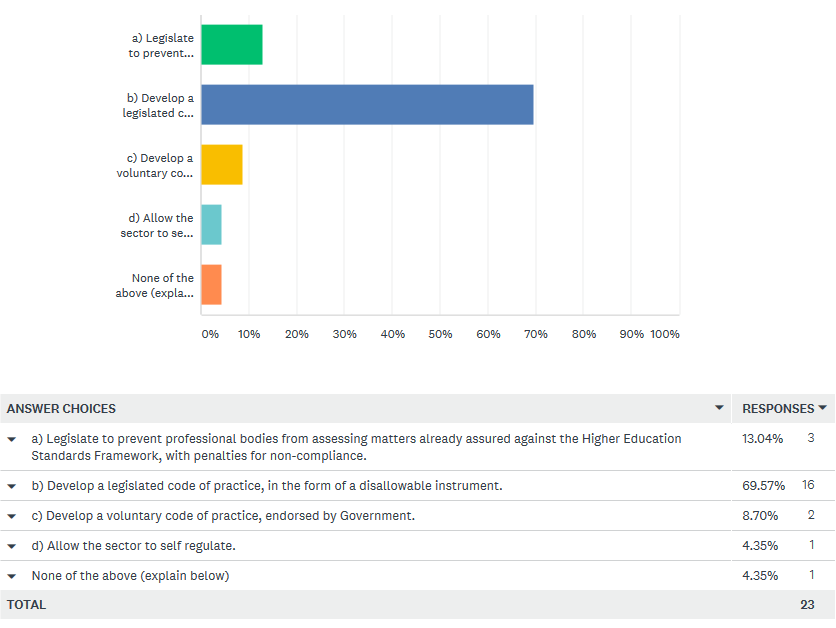Background
In 2017, the final report relating to professional accreditation (commissioned by the
Department of Education and Training) was released . The report considered 1 the extent
and scope of higher education accreditation practices in Australia. The HESP
recommended:
That the government consider requiring professional accreditation bodies to only assess or
raise matters that are profession-specific and not already assured by accreditation against
the Higher Education Standards Framework under the TEQSA Act, whether that
accreditation is undertaken by TEQSA or by a self-regulating provider.
The Panel recommended four mechanisms to achieve this:
a. Legislate to prevent professional bodies from assessing matters already assured
against the Higher Education Standards Framework, with penalties for noncompliance
b. Develop a legislated code of practice, in the form of a disallowable instrument
c. Develop a voluntary code of practice, endorsed by Government
d. Allow the sector to self regulate
Given the importance of these matters to Council, a survey of Council member’s opinions
relating to the recommendations was undertaken.
Summary of findings
Of the 30 schools of social work in Australia, 23 Council members responded to the survey.
Eighty-three percent favoured a legislated code (n=19). The majority of these respondents
(n=16) favoured option (b), while three respondents expressed a preference for option (a).Three respondents favouring option (b) chose to make a comment:
Option b enables a more collaborative approach, while at the same time clarifies
the roles and responsibilities of the various parties, covers the whole sector, and
avoids duplication.
I am persuaded by the arguments presented in the paper and believe that this can
achieve a balance between over-regulation and reliance on self-regulation.
I think it will be important to bring parties to the table on this rather than it
being an imposed code, which I gather is the plan.
Two respondents stated a preference for option (c), a voluntary code of practice. One
respondent expressed a preference for option (d) that the sector should be allowed to self
regulate, making the following comment:
Be careful what you wish for. I can’t say I have been impressed with the training
provided by TEQSA. The AQF is clearly relevant to all social work degrees so
disallowing any discussion of this is destructive. What is the Council trying to
achieve? Has there been feedback from the AASW on a collaborative approach?
This seems to cut across the process decided at the last meeting.
The survey allowed for ‘none of the above’, and one respondent chose this, making the
following comment:
This proposal places an enormous amount of power with TEQSA – they are
government funded and so there is an inherent conflict of interest with this
particularly in terms of government policy around funding higher education; a
focus on international student growth etc. We would be concerned that this would
place additional restrictions on social work educators to be able to carry out their
responsibilities.
The outcome of the survey is noted below:
The outcome of the survey will inform collaborations with AASW as we work toward a
more appropriate model of accreditation for Australian social work education.
1 Professional Accreditation: Mapping the territory. Final Report February available at https://
docs.education.gov.au/system/files/doc/other/
professional_accreditation_mapping_final_report.pdf

